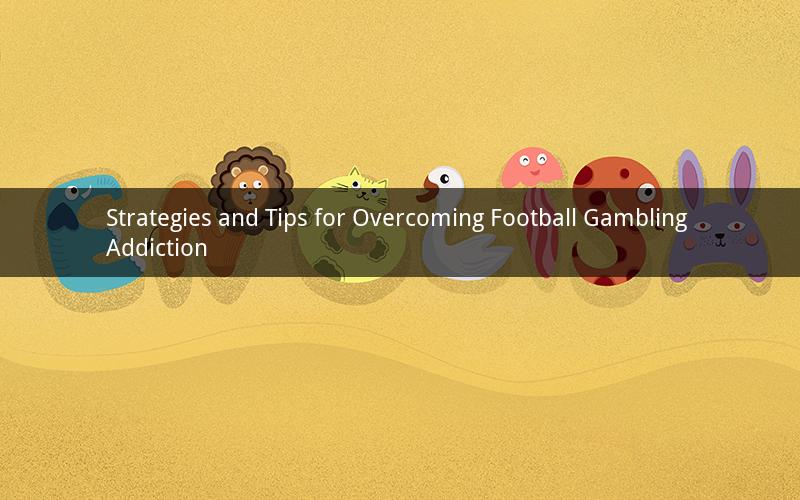
Introduction:
Football gambling has become a popular form of entertainment for many football fans around the world. However, it can easily lead to addiction, causing financial, emotional, and social problems. In this article, we will explore effective strategies and tips on how to quit football gambling and regain control of your life.
1. Identify the Problem:
The first step towards quitting football gambling is to acknowledge that you have a problem. Take a moment to reflect on the impact of your gambling habits on your life. Consider the following questions:
- Have you experienced financial difficulties due to football gambling?
- Has your gambling affected your relationships with family and friends?
- Do you feel the urge to gamble even when you know it's causing you harm?
2. Seek Professional Help:
If you have tried to quit football gambling in the past but have failed, it might be time to seek professional help. Consider consulting a therapist who specializes in addiction. They can provide personalized strategies and support tailored to your specific needs.
3. Set Clear Goals:
To successfully quit football gambling, it is important to set clear, achievable goals. Start by setting a specific target date for quitting, such as a month or three months from now. Break down this goal into smaller, manageable steps, such as:
- Cutting down the amount of money you spend on gambling.
- Reducing the frequency of your gambling sessions.
- Limiting the time spent on gambling-related activities.
4. Find Alternative Activities:
Identifying alternative activities can help fill the void left by football gambling. Here are some suggestions:
- Engage in physical exercise, such as going to the gym or taking up a sport.
- Spend time with friends and family.
- Volunteer for a cause you care about.
- Explore new hobbies, such as painting, reading, or learning a musical instrument.
5. Create a Support System:
Having a strong support system is crucial when trying to quit football gambling. Share your goals and struggles with friends, family, or support groups. Consider the following:
- Join a support group for people struggling with gambling addiction.
- Seek guidance from a trusted friend or family member who can hold you accountable.
- Attend counseling sessions with a therapist who can provide emotional support.
6. Avoid Triggering Situations:
Identify situations or places that trigger your gambling urge and take steps to avoid them. This may include:
- Staying away from online gambling platforms or websites.
- Avoiding social gatherings where gambling is common.
- Keeping your gambling-related items, such as credit cards or cash, out of sight.
7. Develop Coping Skills:
Learn effective coping skills to help manage stress and cravings. Some strategies include:
- Practice relaxation techniques, such as deep breathing or meditation.
- Engage in positive self-talk and remind yourself of the reasons why you want to quit.
- Keep a journal to track your progress and setbacks.
8. Reward Yourself:
Set up a reward system to celebrate your milestones. When you reach a significant goal, such as a week without gambling, treat yourself to something you enjoy, such as a movie night or a relaxing massage.
9. Stay Committed:
Quitting football gambling is a long-term process that requires commitment and dedication. Be patient with yourself and remember that relapse is a possibility. When faced with challenges, remind yourself of the reasons why you want to quit and seek support from your support system.
10. Stay Informed:
Keep yourself informed about the dangers of football gambling and the available resources for recovery. Reading articles, attending workshops, or speaking with experts can help you stay motivated and informed.
Questions and Answers:
1. Q: How can I avoid relapse after quitting football gambling?
A: To avoid relapse, it is important to maintain a strong support system, stay committed to your goals, and continue to develop coping skills. Be prepared for challenges and seek support when needed.
2. Q: Is it normal to feel anxious or depressed when trying to quit football gambling?
A: Yes, it is common to experience feelings of anxiety, depression, or frustration when trying to quit football gambling. These emotions are a part of the recovery process, and it is important to seek support and cope with these feelings effectively.
3. Q: Can I still enjoy football games without gambling?
A: Absolutely! Many people enjoy watching football games without the temptation of gambling. Focus on the excitement and passion of the sport, rather than the potential for financial gain.
4. Q: What should I do if I feel overwhelmed while trying to quit football gambling?
A: If you feel overwhelmed, it is crucial to reach out for support. Talk to a therapist, join a support group, or confide in a trusted friend or family member. They can provide guidance and emotional support during challenging times.
5. Q: Can football gambling addiction be completely cured?
A: While football gambling addiction can be overcome, it is important to recognize that recovery is a lifelong journey. With dedication, support, and coping skills, individuals can achieve long-term sobriety from football gambling.